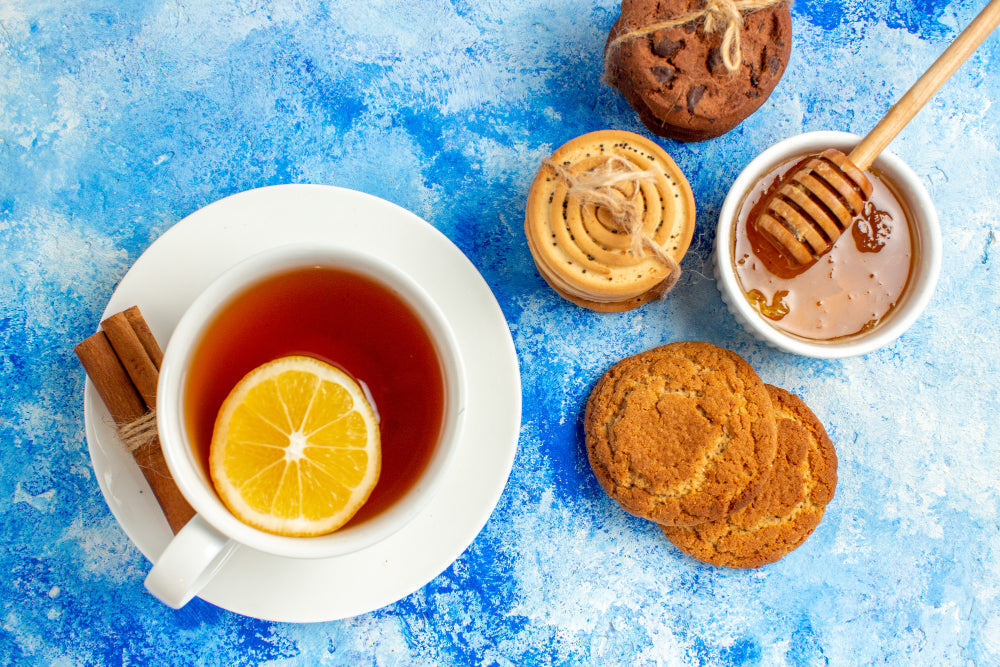Does English Breakfast Tea Have Caffeine? A Straightforward Guide

If you’re thinking of swapping your morning coffee for a cup of English Breakfast tea, you might be wondering does it have caffeine? And if so, how much?
The short answer: yes, English Breakfast tea contains caffeine. But how much caffeine it has and how it compares to coffee or green tea depends on a few simple things. In this guide, we’ll break it all down clearly: the caffeine content, how it compares to other drinks, how you can control it, and when you may want to be cautious.
Let’s dive in.
How Much Caffeine Is in English Breakfast Tea?
Most English Breakfast teas contain between 30 to 60 mg of caffeine per 8 oz cup. That’s roughly half the caffeine of a regular cup of coffee, but more than what you’d get from green tea.
The exact amount depends on:
-
How long you steep it (longer = more caffeine)
-
How much tea you use
-
Whether it’s loose leaf or bagged
-
Water temperature
Loose leaf teas, like the ones we carry, tend to offer more flavor and slightly more caffeine because the leaves are larger and more intact.
English Breakfast Tea vs. Coffee, Green Tea & More
Want to see how it stacks up against other drinks? Here's a simple breakdown:
|
Beverage |
Caffeine (approx. per 8 oz) |
|
Coffee (drip) |
80–100 mg |
|
English Breakfast Tea |
30–60 mg |
|
Green Tea |
20–35 mg |
|
Herbal Tea (e.g. chamomile) |
0 mg |
|
Decaf Black Tea |
2–5 mg |
So while English Breakfast does give you a nice boost, it’s less likely to cause the jitters or crashes that coffee sometimes brings.
Curious about other teas with high caffeine? Here’s a guide to wake-you-up teas.
Why It Makes a Great Coffee Alternative
English Breakfast tea has a unique advantage: it delivers steady energy without the spike-and-crash effect you get from coffee.
That’s partly because black tea also contains L-theanine, a naturally occurring amino acid that can promote calm and focus. So you’re alert, but not wired.
Plus, it’s:
-
Less acidic than coffee (gentler on your stomach)
-
Easier to digest
-
Smooth and flavorful especially with a splash of milk
It’s no wonder many people reach for this brew first thing in the morning.
Can You Control the Caffeine in Your Cup?
Absolutely. Small tweaks make a big difference in how much caffeine ends up in your mug:
-
Steep for less time (1–2 mins) = milder, lower caffeine
-
Use fewer leaves = lighter brew
-
Avoid boiling water = gentler extraction
-
Choose a decaf version = almost caffeine-free
Quick brewing tip: for a medium-strength cup, use 1 tsp of loose leaf tea in 8 oz water at 90–95°C, steep for 3 minutes.
Is It Safe to Drink Every Day?
For most people, yes. Drinking 1–3 cups a day of English Breakfast tea is generally safe and may even offer some health benefits, including:
-
Antioxidants (like theaflavins and catechins)
-
Gentle stimulation without overstimulation
-
Support for mental clarity and digestion
That said, if you’re sensitive to caffeine, pregnant, or managing certain health conditions, it’s always best to consult your doctor first.
When to Skip It
Consider skipping English Breakfast tea or switching to a decaf version if:
-
You’re drinking it after dinner and find it disrupts sleep
-
You’re highly caffeine-sensitive
-
You’re drinking it in large amounts and feel jittery
The good news? You can always enjoy black tea flavor without the caffeine by switching to a high-quality decaffeinated blend.
FAQs About English Breakfast Tea & Caffeine
Q: Does English Breakfast Tea have more caffeine than green tea?
Yes, it typically has more. Green tea averages 20–35 mg per cup, while English Breakfast ranges from 30–60 mg.
Q: Can I drink English Breakfast Tea at night?
You can, but if you’re sensitive to caffeine or sleep lightly, it’s better to enjoy it earlier in the day or try a decaf version.
Q: Is English Breakfast Tea stronger than other black teas?
It’s on the stronger side, but not the most caffeinated. Assam-based blends tend to be bolder.
Q: Is there a decaf version?
Yes many brands offer decaffeinated English Breakfast tea, and it still keeps its smooth, malty flavor.
Q: How does steeping affect caffeine?
Longer steeping time = more caffeine. If you want less, brew for just 1–2 minutes.
Final Thoughts
English Breakfast tea does contain caffeine but it’s a smoother, gentler kind of energy than what you get from coffee. It’s perfect for mornings, great with milk, and easy to tailor to your needs.
If you’re looking for a well-rounded, satisfying brew to start your day, English Breakfast tea is a classic for a reason.



1 comment
Not using boiling water?!!! It also has to be made in a heated teapot otherwise it is tantamount to sacrilege. The water has to be at boiling point, that or you have remove the English from the title of the tea.